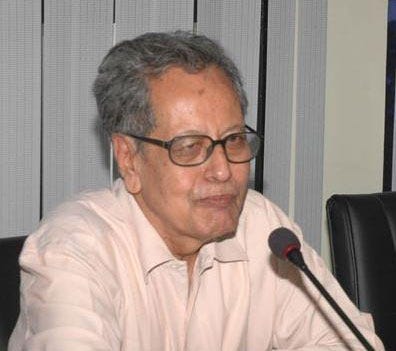Amiya Bagchi's Works Offer Key Insights on Indian Economic Issues
Amiya Bagchi’s senior statesmanship in the study of political economics will be missed says Romar Correa
(Photo Amiya Kumar Bagchi, courtesy Institute for Development Studies, Kolkata.)
December 1, 2024
By Romar Correa*
With the passing of Amiya Kumar Bagchi, India has lost a member of the dwindling band of senior statesmen in non-mainstream political economy. An emeritus professor at the Institute of Development Studies, Kolkata, he passed away this week at the age of 88.
Professor Bagchi was a product of the golden epoch of the tradition of irreverence towards received wisdom at Cambridge University, England. Today, that citadel of critique and critical economics has, alas, toppled. Foundational matters were never resolved in favour of habitual modes of doing economics but it is in the nature of the sweep and sway of ideas that students of the subject today are clueless about the capital theory debates of yesteryear.
Professor Bagchi was a witness to and participant in the exchange between the revival of classical political economy, the close study of Karl Marx, and wrestles with the comprehension of the works of John Maynard Keynes. In his case, a young student-scholar, the elements fused to produce an economic historian who was to go on to earn acclaim as a first-rate practitioner of the craft. Among the many classic books which Professor Bagchi authored, I recall his two-volume The Evolution of the State Bank of India (Bombay: Oxford University Press, 1987).
Unsurprisingly, he brought structure to bear on the medley of facts that constitute the past. Professor Bagchi’s makeup included the work of the French historian Ferdinand Braudel, 1902-1985, an important figure in the Annales School of historiography. Independently, he never ceased to emphasise the role played by imperialism with its evolving manifestations in the dynamics of international capital movements. His scholarship will be sorely missed today as imperialism takes zero-sum game and hate-fuelled forms.
Professor Bagchi was passionate and vocal. He was a believer, more anti-mainstream than non-mainstream. I was once at the receiving end of what I thought was an admonition till I realised that I was honoured to be referred to as a radical economist by him and that he was expressing his frustration that I had not gone far enough!
The scolding was affectionate and its origin is recounted below. My point is that all the greats referred to are knowledgeable and not dismissive of orthodox economics. They grasp the history of economic science, are alive to possibilities and gaps in different schools of thought. Bagchi knew his math and I was once witness to his commentary on the classic Theory of Matrices by FR Gantmacher.
Professor Bagchi was a member of the state planning board, Government of West Bengal. He was the official historian of the State Bank of India. He taught, researched, and guided research at Cambridge (UK), Cornell (USA), Presidency College, Kolkata, and several other universities including in France, Canada, Denmark, and Australia. In 1963, he earned a PhD in Economics from Trinity College, Cambridge; earlier he earned a MA from Calcutta University and a BA from Presidency College, Kolkata.
I first met Amiya Bagchi at a mainstream international event in a plush hotel in Mumbai. He was suited and booted and silent all through. He was there to listen and learn. Chatting during a break, he referred approvingly to behavioural economics. My jaw dropped! Was this the Amiya Bagchi of the panorama of world capitalism, and famed impatience with neoclassical economics?!
That conversation earned me an invitation to a seminar at the Institute of Development Studies, Kolkata, which he founded in 2002 and ran as director until 2012. I am sure I disappointed him because I stayed clear of behavioural finance and continue to remain unconvinced of behavioural economics. The event was memorable because among the other weighty international invitees was the late Ajit Singh, a special member of the Cambridge tribe, who, despite being hampered by Parkinson’s Disease, managed to mesmerise with a soft lecture. I will always treasure a one-to-one chat with our heads literally put together. Dr Singh pioneered an orientation to the study of industrial economics through painstaking empirical detail.
We are so much poorer with one-dimensional economics and wriggles this way and that earning Nobel prizes. Awardees were never distinguished by their distance from the establishment but these years their proximity to corporate-finance-political thinking and policy seems intimate.
Amiya Bagchi was a voice of conscience, a reminder in the midst of the pressures of survival in academia, that out there is a world of exploitation and immiseration that calls for praxis, social scientists that herald theory and practice.
*Romar Correa, an independent researcher in Mumbai, retired as the Reserve Bank of India Professor of Monetary Economics, Bombay University.


